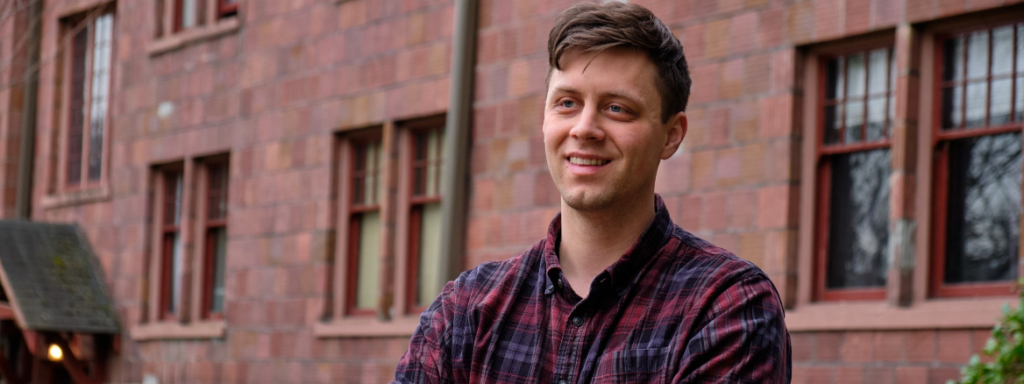Jared Wright ’14, discusses working on refugee resettlement, impactful internships, and more

By Zach Powers
PLU Marketing & Communications
TACOMA, WASH. (March. 2, 2020) — Jared Wright ‘14, political science and global studies double major, arrived at PLU eager to engage in community work and excited to study social justice. He didn’t have specific plans and didn’t know what it would all look like, but he can clearly remember the excitement he felt sitting in his first few classes.
“Professors were encouraging students to expand our worldviews, take all sorts of different prospectives into account, and challenge what we previously held to be true,” he says. “I was into it from the start.”
Wright has successfully embarked on a career at the nexus of the two driving interests with which he arrived at PLU. After graduating magnum cum laude six years ago, he’s worked for an education foundation and an environmental advocacy organization, and now serves as a coordinator of Lutheran Community Services Northwest’s refugee resettlement program.
“Looking back at my four years at PLU, it all makes sense,” Wright says. “I’m really grateful for my PLU experience because I feel like it truly did prepare me for the work I do now that is rooted in social justice and community.”
Wright will be returning to PLU this week for the 9th Biennial Wang Center Symposium. He and four other alumni will discuss “Conflict, Peacebuilding, and the Ethics of Discourse” in a panel moderated by University Pastor Jen Rude on Thursday, March 5 at 3:45 in the Scandinavian Cultural Center.
What is Lutheran Community Services Northwest and can you share a bit about your program, in particular?
Lutheran Community Services Northwest is a regional organization that serves vulnerable children, families, refugees and others throughout Washington, Oregon and Idaho. My program, in particular, is working on refugee resettlement. We help refugees secure housing and work with landlords and property managers to get them approved for apartments.
What goes into that work?
A lot of it is done before the refugees arrive in the country. There is a lot of coordination with volunteers. We work with what we call U.S. ties of the family, so either a close friend or a family member, to determine the best place that we can settle them in. Then it’s about making sure their transition goes pretty smoothly during their first days here – helping them settle into a place and getting them beds, furniture, and other essential household items.
What did you study at PLU and how was your academic experience?
When I started at PLU I had really no idea what I was doing. I was in the IHON (international honors) program, and that had a big impact. Eventually, I came around to double majoring in political science and global studies, plus a minor in Hispanic studies.
I really connected with global studies at PLU. I had a great IHON experience and I was in the Wang Center a lot. The study away program was one of the main things that drew me to PLU. I studied abroad in Oaxaca, Mexico and completed an internship at a rural development organization that was working in conflict resolution and on programs empowering women in rural communities.
Speaking of internships, your resume is jam-packed with them. Is there a first internship that stands out to you as representing the beginning of your professional journey?
It wasn’t exactly an internship, but actually a really cool volunteer opportunity at Fern Hill Elementary (Tacoma) when I was at PLU. I worked as a Spanish tutor and helped out at the afterschool program there.
After that, I worked on Rep. Derek Kilmer’s campaign for Congress in 2012. That was my first big internship where it was connected to what I was studying at PLU and I felt like “oh okay, this is one thing I could see myself doing after this.”
What was your first job after you graduated?
I did the Washington Bus summer fellowship right after I graduated from PLU. The bus is a Seattle-based nonprofit that supports young people in engaging in local and state politics. I spent that summer campaigning, canvassing, and registering folks to vote. It was awesome.
From there, I spent a year in AmeriCorps through a Tacoma-based program called Urban Leaders in Training. I also worked with Graduate Tacoma on a lot of cool projects, including translating a lot of their materials into Spanish. Then, after a couple of years in Oakland, California working in environmental organizing with Clean Water Action, I came home to Tacoma and got connected with Lutheran Community Services.
It’s been a lot of learning and hopping around, but in all of these things, I can definitely see connections to what I studied at PLU. To me, at least, it’s a coherent kind of story.
It seems that way to me as well, and it’s a really cool path you’ve carved for yourself. With that in mind, what are two pieces of advice you’d give current PLU students who are eager to jump into community-based work after graduation like you’ve been able to?
For one, please realize that not everyone is moving along at the same pace. It took me a little while before I felt like I was fully taking advantage of all the opportunities and resources at PLU. I had to first get comfortable in my own skin and comfortable with my place on campus. I didn’t really start diving in until the back end of my sophomore year. So I guess the advice is two-fold, on one hand, try to get involved as soon as possible. On the other hand, please be gracious with yourself and have some patience.
Secondly, I would say definitely try to connect with people that you see as mentors. That could be an older student or it could be a professor that you have a strong bond with. Those people can really help you take your next step.


